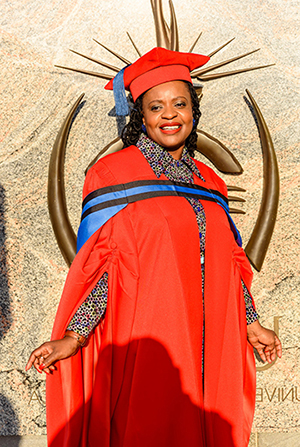

Dr Molebogeng Makobe-Rabothata
Former Unisa lecturer, Molebogeng Makobe-Rabothata, completed her PhD thesis which focuses on positive experiences in the higher education sector.
Exploring the advantages of working in academia inspired Dr Makobe-Rabothata’s fervent patriotism towards Open Distance Learning (ODL) institution.
In 2000, Makobe-Rabothata was employed as a junior lecturer in the Department of Psychology and was immediately promoted to senior lecturer after completing her master's degree through the University of Pretoria in 2003.
As a young academic and mother of two children, Makobe-Rabothata enjoyed flexible working hours which allowed her to plan around her children’s activities. Within the organisation, she valued academic activities such as seminars, colloquiums and workshops about various transformation-related topics by relevant experts.
"I also enjoyed the academic experience of travelling which afforded me the opportunity to present conference papers nationally and internationally," she said.
The only challenge Makobe-Rabothata struggled with was marking assignments and examination scripts. She said that the workload delayed the completion of her PhD studies.
"Without a PhD in academia, one has limited professional, career growth and promotional opportunities," she said.
I subsequently left Unisa in 2014 to join the public sector and I continued to work within the field of applied psychology.
The news team interviewed Dr Molebogeng Makobe-Rabothata about her research focus
The academic environment is characterised by internal factors (establishing and managing high quality teaching and learning experiences for students) and external factors (globalisation, decolonisation, transformation and increased application of advanced information technology in all aspects of higher education and policy changes). This sometimes results in stressors and burnout among academics. Being a young aspiring academic myself, this raised curiosity. The reason for concentrating on academics was encouraged by the fact that academics are regarded as significant stakeholders who contribute to the core business of higher learning institutions. Their primary role is - but is not limited to - teaching and learning, research, academic citizenship and community engagement in these institutions.
In a historically colonised country, like South Africa, any academic activity should be reconstructed and deconstructed, using appropriate worldviews, epistemological paradigms and indigenous methodologies which are culturally appropriate. Initially when I conceptualised and designed my research, my intention was to create a theoretical framework on which a quantitative measuring tool to assess the positive experiences of working in academia would be based.
Like most young academics, this proved to be an epistemologically naïve stance. As I authentically immersed myself in the study, I realised that a traditional Western approach and measuring tool would not be ideal because it is not relevant and authentic to understanding positive experiences in an African university that includes diverse academic employees.
To be able to understand the positive experiences of working in academia differently, it is necessary to change our epistemological paradigm so that we are able to understand "otherness" through adopting a more relevant, decolonised and practical approach. This is so because in an African university there is a co-existence of academics of different cultural backgrounds and multiple realities.
The co-existence of diverse academics requires a context-appropriate conceptualisation and understanding of positive experiences. It is within this given context that my research proposes the adoption of Lekgotla as a traditional African concept and intervention practice to understand the positive experiences of working in academia.
The contribution of the adoption of Lekgotla to this academic space is that it does not only promote and serve the interests of management, because by nature Lekgotla includes everybody and assumes an equality approach. Everybody enters the communication process as equal partners and everybody’s input is valued. Through the adoption of academic Lekgotla, participants would be able to understand themselves better; learn from one another and will therefore be provided with a space to reflect and share their unique personal experiences of working in academia.
I have learned that knowledge production is political and complex. There are always politics about whose knowledge we are producing; for what purpose; which method; and whose method is used to produced knowledge. The PhD has taught me that African indigenous knowledge systems are a great source of "scientific" and authentic knowledge production as Lekgotla has proven in this research.
* By Lesego Ravhudzulo, Journalist, Department of Institutional Advancement
Publish date: 2020-02-12 00:00:00.0